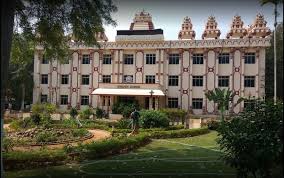Want to get the news from EleListing?
Subscribe for our newsletter here!


National Sanskrit University
Tirupati – 517 507
Tirupati District
Andhra Pradesh, India
Historical Background
The National Sanskrit University originated as the Rashtriya Sanskrit Vidyapeetha in 1961, guided by the Ministry of Education, Government of India. It achieved the status of a central university in 2020 and was renamed the National Sanskrit University. This institution was established to revitalize and advocate for Sanskrit as a medium of higher education and research, ensuring its significance in the modern era.
Campus and Facilities
Situated in the revered city of Tirupati, the NSU campus provides a tranquil and motivating atmosphere ideal for scholarly activities and inquiry. The infrastructure harmoniously integrates traditional Indian architectural styles with contemporary amenities, symbolizing the university’s dedication to merging ancient knowledge with modern requirements.
Essential Amenities
Academic Buildings: Spacious classrooms and lecture theatres outfitted with contemporary teaching tools.
Library: The university features a comprehensive library housing a vast array of Sanskrit manuscripts, ancient literature, modern scholarly works, and digital materials.
Hostels: Gender-specific hostels providing comfortable and safe living arrangements with necessary facilities.
Computer Labs: Furnished with cutting-edge technology to aid research in computational linguistics and e-learning resources for Sanskrit.
Auditorium and Seminar Halls: Spaces intended for cultural activities, scholarly meetings, and seminars.
Sports and Leisure: Facilities for various indoor and outdoor sports, promoting a well-rounded student experience.
Academic Offerings
NSU provides an extensive selection of undergraduate, postgraduate, and doctoral courses centered on Sanskrit and related fields. The curriculum is crafted to offer a thorough comprehension of classical knowledge systems while integrating modern academic approaches.
Departments and Schools
Department of Vyakarana (Grammar):
Focuses on Panini’s grammatical rules and other classical texts.
Offers courses on linguistic frameworks and their practical uses.
Department of Sahitya (Literature):
Examines classical Sanskrit poetry, drama, and prose.
Fosters creative writing and comparative literary analysis.
Department of Vedanta (Philosophy):
Investigates Indian philosophical streams, including Advaita, Dvaita, and Vishishtadvaita.
Conducts advanced studies on the Upanishads and Brahma Sutras.
Department of Jyotisha (Astronomy and Astrology):
Encompasses ancient Indian knowledge systems pertinent to astronomy and astrology.
Integrates both theoretical and practical methodologies.
Department of Yoga and Ayurveda:
Concentrates on traditional health sciences and their applicability in modern wellness.
Provides certificate and diploma courses in addition to degree programs.
Department of Education and Pedagogy:
Prepares educators in Sanskrit teaching through B.Ed and M.Ed programs.
Highlights contemporary teaching methods for classical languages.
Research and Development
Research forms an essential part of the university’s mission. NSU champions interdisciplinary research in Sanskrit and its relevance across diverse fields such as technology, linguistics, and cultural studies.
Manuscript Conservation: The university engages in efforts to digitize and translate rare Sanskrit documents, enhancing accessibility for scholars globally.
Interdisciplinary Research: Initiatives that fuse Sanskrit with modern sciences, artificial intelligence, and computational linguistics are prioritized.
Research Centers: Specialized centers dedicated to Vedic sciences, ancient mathematics, and traditional arts encourage pioneering academic endeavors.
Faculty
The university takes pride in its esteemed faculty, which comprises renowned Sanskrit scholars, researchers, and practitioners of traditional knowledge systems. Faculty members actively mentor students and significantly contribute to both national and international academic discourse.
Extracurricular Engagement
NSU embraces holistic education and motivates students to partake in various extracurricular activities.
Cultural Events: Regular showcases of classical music, dance, and theater performances in Sanskrit.
Debates and Contests: Events such as Sanskrit elocution, poetry recitation, and shloka chanting competitions.
Festivals: Observance of traditional festivities, including Vasant Panchami and Sanskrit Week, enriches cultural understanding.
Community Engagement
In alignment with its mission, NSU is committed to community service, emphasizing the propagation of Sanskrit and Indian heritage. The university organizes workshops, Sanskrit literacy camps, and training sessions for teachers and enthusiasts.
Employment and Career Prospects
Graduates from NSU enjoy a variety of career pathways, spanning academia and research to media, translation, and computational linguistics. The university’s placement cell collaborates closely with institutions, schools, and organizations to facilitate job opportunities in teaching, content development, and cultural management.
Enrollment Process
Admission to NSU is grounded in merit, with entrance examinations for specific programs. The university also provides scholarships to eligible candidates, ensuring that financial barriers do not impede access to quality education.
Essential Admission Information
Application Method: Available in both online and offline formats.
Eligibility Standards: Vary by program, with a strong focus on prior knowledge of Sanskrit for advanced studies.
Scholarships: Available based on merit and financial need.
| Serial# | Title | Estimated Cost | Program type |
|---|